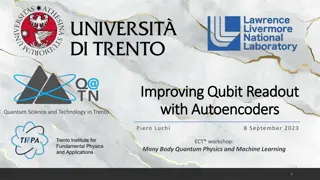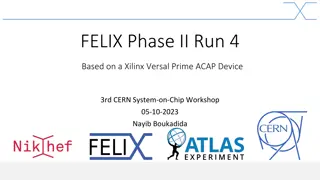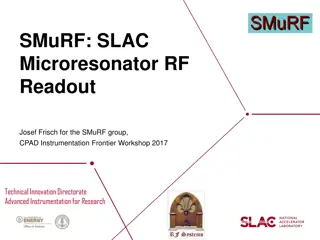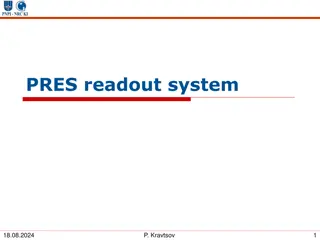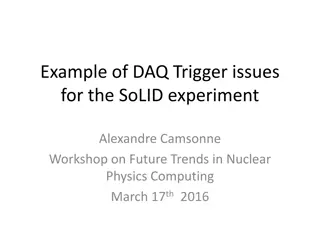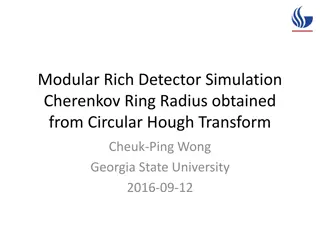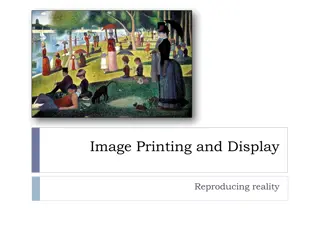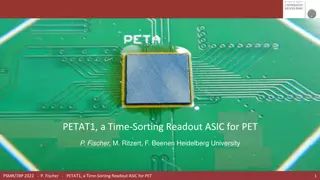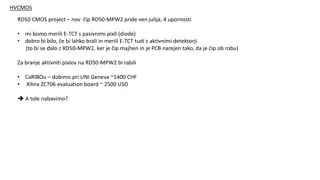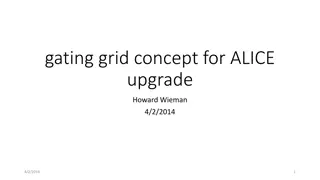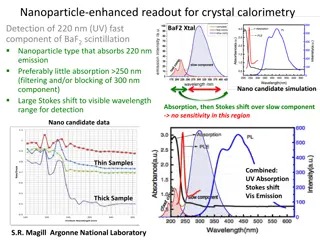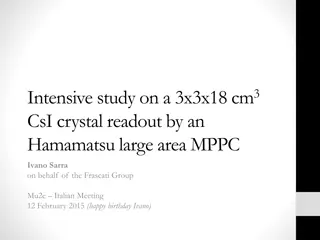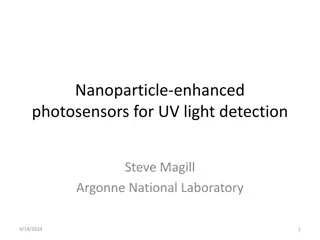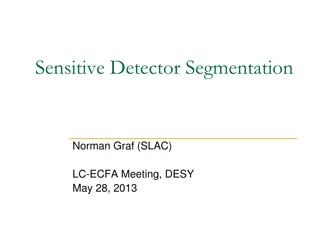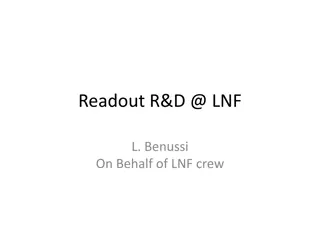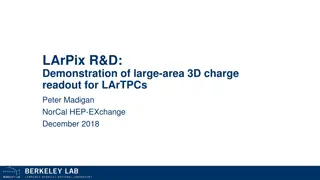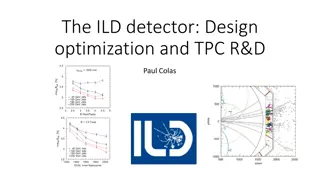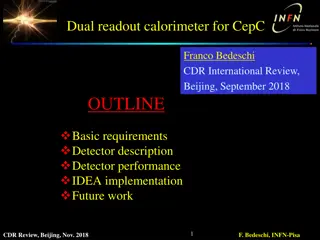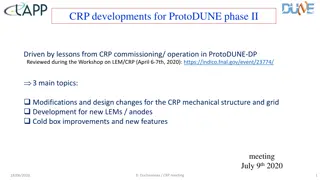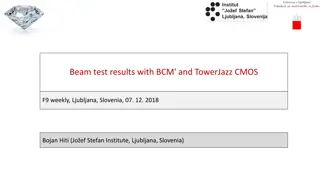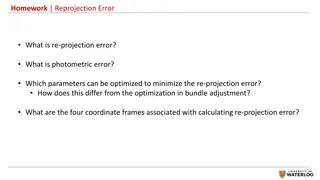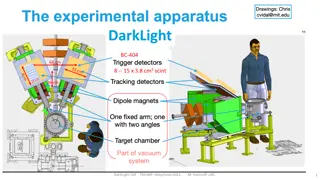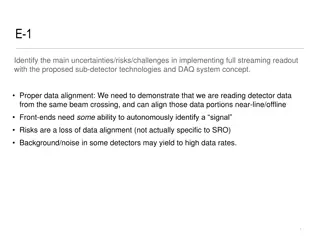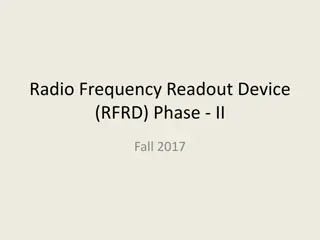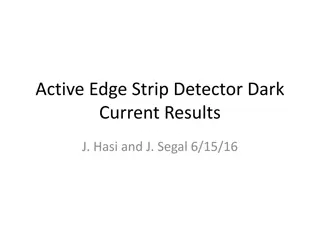Innovations in Pixel Detector Technology for Photon Science
Technologies and advancements in pixel detector development for photon science applications are showcased in this content. Topics discussed include balancing gain and dynamic range in hybrid pixel detectors, performance assessments of integrating pixel detectors, and strategies for photon detection
4 views • 21 slides
Improving Qubit Readout with Autoencoders in Quantum Science Workshop
Dispersive qubit readout, standard models, and the use of autoencoders for improving qubit readout in quantum science are discussed in the workshop led by Piero Luchi. The workshop covers topics such as qubit-cavity systems, dispersive regime equations, and the classification of qubit states through
3 views • 22 slides
Understanding FELIX Phase II Run 4 and Versal Prime ACAP Device
Explore the advancements in FELIX Phase II Run 4, leveraging Xilinx Versal Prime ACAP Device, showcased at the 3rd CERN System-on-Chip Workshop. Witness massive improvements in trigger rates, data readout rates, and interactions per bunch crossing. Dive into the hardware details and Versal Prime's c
2 views • 36 slides
SMuRF: SLAC Microresonator RF Readout
SMuRF group at SLAC developed a cutting-edge RF readout system for cryogenic micro-resonators used in research. The system features cold resonators tuned with TES current and a flux ramp to eliminate 1/f noise. Key technical challenges include noise, linearity, wide bandwidth, and computation power.
3 views • 16 slides
Are you ready to take your business to the next level? Check out Maven Group
Elevate your brand with a stunning website that reflects your vision. Our team at Maven Group Global is dedicated in bringing your ideas to life, pixel by pixel. Let's build an online home for your brand together.
0 views • 2 slides
Analysis of Epi/Stroma Segmentation with High Pixel Agreement Rates
In this analysis of Epi/Stroma segmentation, multiple images were evaluated, showing overall pixel agreement rates ranging from 0.9211 to 0.9625. True Positive Rates were high, while False Negative Rates varied. The study provides insights into the effectiveness of the segmentation process.
0 views • 10 slides
Understanding Pixel Relationships in Image Processing
Exploring the fundamental concepts of pixel relationships in image processing, including 4-neighbors, 8-neighbors, adjacency criteria, and their significance in digital image analysis. The content covers the basics of pixel connectivity and neighbor sets, offering insights into how pixels interact a
1 views • 67 slides
Pixel Array Status and Drawing Rules for High-Resistivity Epi Design
This collection of images and descriptions provides an overview of the pixel array status as of April 26, 2019, along with drawing rules for high-resistivity epi design. The pixel array features various components such as Pixel_S1, Pixel_S3, and the overall array structure. Drawing rules highlight t
4 views • 9 slides
Particle Readout System Overview
This presentation covers the Particle Readout System for events happening on August 18, 2024, detailing the system requirements, detectors involved such as the Time Projection Chamber (TPC) and Forward Tracker (FT), monitoring devices like Beam Position Monitors (BPM), as well as the Forward Tracker
0 views • 30 slides
Understanding DAQ Trigger Issues in SoLID Experiment
Explore DAQ trigger challenges faced in the SoLID experiment through examples, including trigger goals, data readout specifics, and experiment setups. Learn about managing high luminosity, reducing data rates, improving signal quality, and handling bottleneck issues for effective data acquisition. D
0 views • 22 slides
Inexpensive Digital Azimuth Readout Challenge by Paul Wade W1GHZ
This challenge calls for creating an inexpensive digital remote readout for azimuth, particularly useful in EME and microwaves. The project involves expertise with microprocessors like PIC, Arduino, Raspberry Pi, etc. The goal is to develop a functional system, share the plans, and the parts expense
0 views • 12 slides
Advancements in Pixel Readout R&D for Large Liquid Argon Time-Projection Chambers
Explore the latest developments in pixel readout research and development for large liquid argon time-projection chambers (LArTPCs) presented by Dan Dwyer at the CYGNUS Collaboration Meeting. Learn about signal characteristics, wire signal ambiguity, challenges in true 3D readout, and the innovative
0 views • 13 slides
Cherenkov Ring Radius Determination from Modular Rich Detector Simulation
Explore the process of obtaining the Cherenkov ring radius using Circular Hough Transform in a modular rich detector simulation. The study, conducted by Cheuk-Ping Wong from Georgia State University, delves into Monte Carlo results, ring finder algorithms, event displays, and radius distributions in
0 views • 20 slides
Understanding Image Display and Halftoning Techniques
Images are reproduced for display on various devices like televisions, computer monitors, and newspapers with specific characteristics such as pixel shape, spatial resolution, and color depth. Issues with display devices, such as pixel resolution and color depth, affect fidelity. Halftoning methods,
3 views • 44 slides
The Sound Pixel Project: Innovative Audio Design and Implementation
Explore the Sound Pixel Project, a cutting-edge initiative showcasing a transportable and easily constructed frame design concept utilizing lightweight aluminum alloy composite framing. With a focus on independent sound emitters and six sets of stereo speakers, the project also delves into music mix
0 views • 6 slides
Advancements in PET Readout Technology: PETAT1 Time-Sorting Readout ASIC
Cutting-edge PET readout systems now utilize specialized ASICs for data acquisition from SiPMs, eliminating the need for FPGAs and reducing complexity, space requirements, and power consumption. The PETAT1 ASIC, developed by P. Fischer and team at Heidelberg University, enables time-ordered hit data
0 views • 18 slides
Advanced Technologies for Particle Detection and Monitoring
Cutting-edge technology such as HVCMOS RD50-CMOS project along with CaRIBOu and Xilinx ZC706 evaluation board are being employed for precise measurements in E-TCT with passive and active pixel detectors. The development of Radiation Monitor Sensor Boards for ITk, involving sensors like RadFETs and d
0 views • 6 slides
Concept for ALICE Upgrade: Gating Grid by Howard Wieman
The Technical Design Report outlines a plan to use GEM detectors for the TPC readout in ALICE upgrade, addressing issues with positive ion back flow. A modified gating grid design is proposed to block 100% of the back flow while maintaining data rate. The concept involves specific parameters and ope
0 views • 14 slides
Nanoparticle-Enhanced Readout for Crystal Calorimetry: BaF2 Scintillation Detection
Nanoparticles with specific absorption and emission properties are explored to enhance the readout process for BaF2 crystal calorimetry, focusing on detecting the fast 220nm UV component. The goal is to achieve a large Stokes shift to the visible wavelength range for efficient detection, while minim
0 views • 7 slides
Intensive Study on CsI Crystal Readout by Hamamatsu MPPC
This study presents detailed analysis of a 3x3x18 cm³ CsI crystal readout using a Hamamatsu large area MPPC. Various tests were conducted on the MPPC and electronics setup, including laser pulsing and signal reduction. The results show improved time resolution and slewing correction, enhancing the
0 views • 23 slides
Advances in Nanoparticle-Enhanced Photosensors for UV Light Detection and Quantum Confinement Research
Nanoparticle-enhanced photosensors are being developed by Steve Magill at Argonne National Laboratory for UV light detection, utilizing quantum confinement to enhance electronic and optical properties. Quantum confinement creates discrete energy levels in nanoparticles smaller than the electron wave
0 views • 30 slides
Efficient Virtual Segmentation for Large-scale Detector Systems
Highly segmented detectors with millions to billions of readout channels require a practical approach for simulation and reconstruction. Implementing each channel separately is impractical, necessitating the use of virtual segmentation to define readouts for different detector components. Dependenci
0 views • 11 slides
Advancements in Readout R&D at LNF
The LNF crew, led by Benussi, is engaged in various activities at LNF, including studies on alternative gas mixtures, different GE1/1 gap sizes, material aging, readout optimization, and strips layout. Work is in progress on designing a dedicated PDB readout board for a GEM chamber, alongside improv
0 views • 8 slides
Comparison of Charge Sharing Mechanisms in HERD SCD
This study delves into the analysis of charge sharing mechanisms in the HERD SCD using simulations and experimental data. It explores the impact of coupling capacitors on charge sharing efficiency and readout strip performance under various conditions to enhance signal detection and improve CCE. The
0 views • 21 slides
Advancements in Large-Area 3D Charge Readout for LArTPCs
Demonstrations featuring large-area 3D charge readout for Liquid Argon Time Projection Chambers (LArTPCs) were showcased by Peter Madigan at NorCal HEP-EXchange in December 2018. The challenges of readout in high-rate environments were discussed, along with the potential of pixelated TPCs in 3D LArT
0 views • 13 slides
Advances in ILD Detector Design and TPC R&D
Explore the latest developments in ILD detector optimization and TPC research, focusing on enhancing event reconstruction accuracy and energy resolution. Learn about the ILD concept based on particle flow, the ILD group activities, organizational structure, technical advancements, and TPC readout te
0 views • 22 slides
Understanding K-means Clustering for Image Segmentation
Dive into the world of K-means clustering for pixel-wise image segmentation in the RGB color space. Learn the steps involved, from making copies of the original image to initializing cluster centers and finding the closest cluster for each pixel based on color distances. Explore different seeding me
0 views • 21 slides
Dual-Readout Calorimeter for CepC: Overview and Key Features
The dual-readout calorimeter for CepC, as discussed in the International Review in Beijing, September 2018, is designed to optimize electromagnetic, hadronic, and jet resolution. With features like large sampling fraction for good EM resolution, event-by-event correction for EM fluctuations, and int
0 views • 22 slides
Development Updates for ProtoDUNE Phase II: CRP Modifications and Testing
Updates on the development of Charged Readout Plane (CRP) for ProtoDUNE Phase II driven by lessons from commissioning and operation in ProtoDUNE-DP. Major topics include modifications for CRP mechanical structure, new LEM development, cold box improvements, and testing plans. Detailed steps per syst
0 views • 7 slides
Beam Test Results with BCM and TowerJazz CMOS F9 Weekly
Bojan Hiti from Jožef Stefan Institute in Ljubljana, Slovenia conducted a series of tests involving BCM prototype readout chip and TowerJazz CMOS at CERN SPS H6. The experiments included beam tracking, analog readout, and chip configurations for the ATLAS Beam Condition Monitor upgrade. Detailed re
0 views • 19 slides
Understanding Spatial Error in Photogrammetry
Reprojection error in photogrammetry refers to the discrepancy between a known point in a scene and its projected position on an image. Photometric error, on the other hand, involves errors related to pixel intensity values. To minimize reprojection error, parameters such as camera intrinsics, extri
0 views • 5 slides
DarkLight CM TRIUMF May/June 2023 Prototype Scintillator Development Details
The DarkLight project at TRIUMF in May/June 2023 involves the development of prototype scintillators with specific requirements for triggering, timing adjustments, and readout capabilities. Various images depict different components such as SiPMs, front-end readout cards, and TOF Alpha bars. The pro
0 views • 14 slides
Challenges and Common Solutions in Implementing Full Streaming Readout for Sub-Detector Technologies
Implementing full streaming readout with proposed sub-detector technologies and DAQ system concept poses challenges including proper data alignment, risks of data loss, and background noise affecting data rates. The transition point for electronic components from detector-specific to common solution
0 views • 9 slides
Summary of ITk Pixel Status Reports and Organization Updates
The content provides updates from ITk Pixel Status Reports on project transitions, decision-making processes, organizational structure, and key focus areas. It also outlines responsibilities, strategic planning, and critical items to address within the project timeline. The Planning section outlines
0 views • 24 slides
Radio Frequency Readout Device (RFRD) for Tightness Measurement of Anchor Bolts
The Radio Frequency Readout Device (RFRD) Phase II project aims to reduce the time needed to check the tightness of nuts on anchor bolts. By utilizing a passive RFRD that measures capacitance changes in washers, the system offers a wireless, cost-effective solution for monitoring nut tightness. With
0 views • 27 slides
Progress Update on Phase-2 CMS Pixel R&D Activities in Italy by Marco Meschini
Marco Meschini presents updates on Phase-2 CMS Pixel R&D activities in Italy. Updates include sensor production, wafer batches funded, thinning processes, bump bonding technologies, and irradiation campaigns. The meeting discusses wafer specifications, Epi wafer procurement challenges, and productio
0 views • 28 slides
Update on Pixel and IBL Detectors for Run 2 at CERN
Publications and plot approvals for the IBL paper are in review stage, with updates requested for the author list. Various proceedings and notes are being prepared, including a 4-layer pixel paper proposal focusing on LS1 work and early beam results. Plans for mid-2015 include beam splashes validati
0 views • 12 slides
Comparative Study of Different Strip Detectors for Dark Current Results
Explore various strip detectors including old baseline, extra-distance, and guard ring surrounding detectors through images showing pixel current behavior when biased. The study highlights the impact of guard ring presence on lowering pixel current in these detectors.
0 views • 6 slides
Performance of Scintillation Pixel Detectors with MPPC Read-Out and Digital Signal Processing
Mihael Makek presents the performance evaluation of scintillation pixel detectors with MPPC read-out and digital signal processing at the 2nd Jagiellonian Symposium on Fundamental and Applied Subatomic Physics in Krakow, 2017. The study includes the construction and testing of segmented detector arr
0 views • 25 slides
Thermomechanical Analysis of Pixel-Hybrid Module by Leonardo Ribeiro
The thermomechanical analysis of the pixel-hybrid module conducted by Leonardo Ribeiro explores the challenges faced due to cycling between 213 K and room temperature, emphasizing the impact of different thermal expansion coefficients on the structure. The study involves a detailed examination of th
0 views • 19 slides
